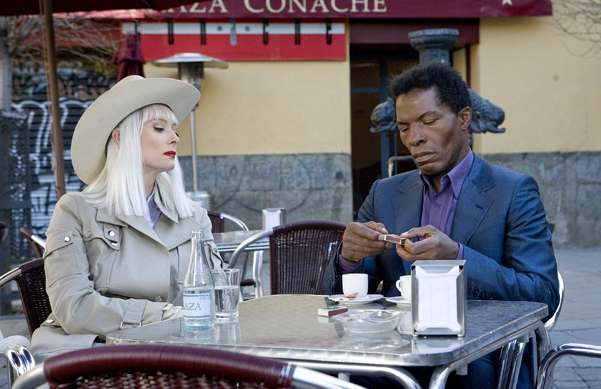The Limits of Control

A man (Isaach De Bankolé, "Coffee and Cigarettes," TV's "24") is given an assignment in an airport by Creole (Alex Descas, "Trouble Every Day," "Coffee and Cigarettes") in Spanish, which the man does not speak. French (Jean-François Stévenin, "The Man on the Train") interprets for Creole. The man is told to 'use your imagination and your skills,' that 'Everything is subjective' and that 'Those who think they are bigger than the rest are headed to the cemetery.' He's given a set of keys and a matchbook, which he inspects as he drinks two cups of espresso (in separate cups) on a plane to Madrid in "The Limits of Control."
Laura's Review: C+
Writer/director Jim Jarmusch's ("Stranger Than Paradise," "Broken Flowers") latest is sure to be appreciated by his hard core fans, but it well may put the lesser and the uninitiated off. This screed against big Government and technology in favor of Bohemianism, music, film and painting by way of searching for one's own reality may be pretentious (and require a touch of Spanish), but it is also a cinematic puzzle that will divert film geeks. The lone man (as he is described in the press notes) does as he was told - 'Go to the towers, go to the cafe, wait a couple of days and look for the violin.' The first is the circular Torres Blancas apartment building in Madrid, a unique bit of architecture. At the cafe, when an order for two espressos arrives as one double, the waiter (Óscar Jaenada, "November," "Che: Part Two") is told in no uncertain terms that this is unacceptable (and what does it have to do with anything? Jarmusch once witnessed De Bankolé do this same thing...) He then goes to the national gallery and, in a room full of paintings of musical instruments, takes in just one. This leads to his meeting with Violin (Luis Tosar, "Mondays in the Sun," "Take My Eyes"), who begins, as do all the man's contacts, with 'You don't speak Spanish, do you?' Violin asks if he likes music and warns about a girl who is a crisscross before getting down to the business of exchanging Le Boxer matchbooks. When Violin departs, the man opens the matchbook, removes a small folded piece of paper containing a series of letters and numbers, and swallows it, just as he did on the plane. After another visit to the gallery, where he views a nude, he arrives back at the towers to find a nude woman (Paz de la Huerta, "Choke") in oversize glasses lying on his bed. And so on... Films are discussed with a white blonde in cowboy gear (Tilda Swinton, "The Curious Case of Benjamin Button") who notes that she particularly likes movies where people just sit and don't say anything which, of course, they proceed to do. Later, the man sees her apparent kidnapping, which he does nothing to stop, then rounds a corner to spy her in a movie poster for Un Lugar Solitario (A Solitary Place). He meets "Mystery Train's" (Youki Kudoh, "Memoirs of a Geisha," "Rush Hour 3") on the train to Seville and his blue sharkskin suit with violet shirt are changed for a yellow ochre one set off with burnt umber. He finds another round white tower, but squares are the thing in Seville. He enjoys a stunning flamenco practice in a closed club where the singer repeats the words of the Creole and flashes his matches, gets an antique guitar from John Hurt ("Hellboy," "The Skeleton Key") which a tattooed Gael García Bernal ("Y Tu Mama Tambien," "Blindness") tries to steal before connecting him with the driver (Hiam Abbass, "The Visitor," "Lemon Tree") who will take him to his ultimate destination - an unusual white house built into desolate countryside where the black helicopter that's been buzzing him all along finally finds a landing spot. Here, it appears, is the man's target - an American (Bill Murray, "Rushmore," "Broken Flowers") who rails against the inadequacy of Spanish technology and the presence of Bohemians. (And, oh yes, the man has changed his suit again, but will replace it with a lime green velour track suit embroidered with the African continent on his return to Madrid.) "The Limits of Control" marks Jarmusch's first collaboration with Director of Photography extraordinaire Christopher Doyle ("In the Mood for Love," "Paranoid Park") which may explain the wardrobe changes. The film certainly has a strong visual style, surrounding De Bankolé with art and architecture, when it is not following the actor down the alleyways he strides down like an erect panther (De Bankolé has loads of physical presence, and those who accuse him of inexpression are lost on subtlety). Music is also distinctive. But just what does all of this serve? Why is actress Hiam Abbass hired to serve as a silent driver? Because she's trendy right now? Tilda Swinton's always been trendy, but there is something borderline silly about her performance here. de la Huerta's an intriguing presence, but is Jarmusch saying sex shouldn't be part of this reality? (Interestingly, in a film that seems to revere the natural ('Life is a handful of dirt.'), food, excepting one still life of sliced pear, fails to make an appearance as well). Bernal is the only 'contact' that creates any real life beneath his facade - the other are all ironic cameos of sorts. "The Limits of Control" will remind many of "Ghost Dog: The Way of the Samurai" with its tai chi and pigeons. It's an existential mystery that will keep some trying to connect the dots but in the end it doesn't all add up.
Robin's Review: DNS
DNS

